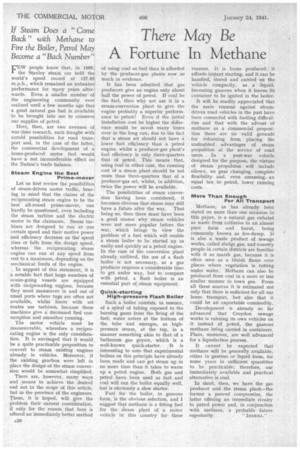There May Be
Page 32

If you've noticed an error in this article please click here to report it so we can fix it.
A Fortune In Methane
of using coal as fuel than is afforded by the producer-gas plants now so much in evidence.
It has been admitted that gas producers give an engine only about half the power of petrol. If coal be the fuel, then why not use it in a steam-conversion plant to give the engine probably a superior performance to petrol? Even if the initial installation cost be higher the difference would be saved many times over in the long run, due to the fact that a steam set should not have a lower fuel efficiency than a petrol engine, whilst a producer-gas plant's fuel efficiency is only three-quarters that of petrol. This means that, using oal in either case, the running cost -of a steam plant should be not more than three-quarters that of a producer-gas set, whilst, in addition, twice the power will be available.
The possibilities of steam conversion having been considered, it 'becomes obvious that steam May still have a future after the war. That being so, then there must have been a good reason why steam vehicles were not more popular before the war, which brings to view the problem of a fuel which will enable a steam boiler to be started up as easily and quickly as a petrol engine. In the case of the conversion plant already outlined, the use of a flash boiler is not necessary, as a gas producer requires a considerable time to get under way, but to compare with petrol, a flash boiler is an essential part of, steam equipment.
Quick-starting High-pressure Flash Boiler
Such a boiler consists, in essence, of a spiral of tubing exposed to the burning gases from the firing of the fuel; water enters at the bottom of the tube and emerges, as highpressure steam, at the top, in a manner something akin to that of a bathroom gas geyser, which is a well-known quick-starter. It is interesting to note that experimental boilers on this principle have already been made and can get steam up in no more time than it takes to warm up a petrol engine. Both gas and petrol have been used as fuel and coal will run the boiler equally well, but is obviously a slow starter.
Fuel for the boiler, in gaseous form, is the obvious selection, and I suggest that methane is a fitting fuel for the steam plant of a motor vehicle in this country for these reasons. It is home produced; it affords instant starting, and it can be handled, Stored and carried on the vehicle compactly, as a ‘liquid, becoming gaseous when it leaves its container to be ignited in the boiler.
It will be readily appreciated that the main reasons against steamdriven road vehicles in the past have been connected with fuelling difficulties and that with the advent of methane as a commercial proposition there are no valid grounds for refraining from placing the undoubted advantages of steam propulsion at the service of road
users. In a post-war vehicle designed for the purpose, the virtues , of steam propulsion will include silence, no gear changing, complete flexibility and, even assuming/ an equal tax to petrol, lower running costs.
More Than Enough For All Transport
Methane, as has already been stated on more than one occasion in this paper, is a natural gas exhaled as waste from collieries in an almost pure form and burnt, being commonly known as fire-damp. It is also a waste product of sewage works, called sludge gas, and country people in certain districts are familiar with it as marsh gas, because it is often seen as a bluish flame over places where vegetation is rotting under water. Methane can also be produced from coal in a more or less similar manner to town gas. From • all these sources it is estimated not only that there is sufficient for all our home transport, but also that it could be an exportable commodity. Development is already so far advanced that Croydon sewage works is running its own vehicles on it instead of _petrol, the gaseous methane being carried in containers. Plans, moreover, are well advanced for a liquefaction process.
It cannot be expected that methane will be generally available, either in gaseous or liquid form, for some years in sufficient quantities to be practicable; therefore, our immediately available and practical alternative is coal.
In short, then, we have the gas producer and the steam plant—the former a proved compromise, the latter offering an immediate rivalry to petrol power and, in conjunction with methane, a probable future
superiority. ``




















































